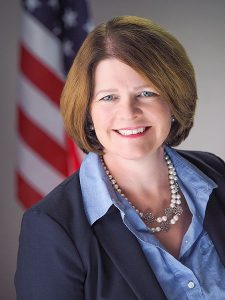Recent reports from the business publication Bloomberg indicates that the U.S. Federal Trade Commission (FTC) will not be radically changing the analysis used to address antitrust issues presented by patent law issues. The news stems from comments made by FTC acting chairman Maureen K. Ohlhausen at the 32nd Annual Intellectual Property Law Conference sponsored by the American Bar Association (ABA). Ohlhausen would go on to explain that the recent updates to the IP Licensing Guidelines, which occurred in January 2017, were “modest”, provided the FTC with flexibility, and continue to recognize that “IP law grants enforceable rights.”
Ohlhausen’s explanation to the ABA IP conference of the 2017 IP Licensing Guidelines should put many at ease, particularly coming months after the FTC released its study of the business models of patent assertion entities (PAEs). The study, which was by no means exhaustive, revealed data on PAE activity which some observers noted at the time was not conclusive enough to make policy recommendations. Criticisms of the methodology employed by the FTC include the small number of PAEs surveyed as well as the generalized nature of the questions asked of those firms rendering conclusions which were incomplete. Yet that didn’t stop major news outlets from completely misreporting the study, writing that the FTC had harsh words for “patent trolls” when really, what the FTC said in the study was:
“In the Commission’s view, a label like “patent troll” is unhelpful because it invites pre-judgment about the societal impact of patent assertion activity without an understanding of the underlying business model that fuels such activity.”
Given all of the confusion created by the FTC’s release of the PAE study, the fact that its conclusions do not appear as though they’re impacting FTC policy changes seems to be a positive step. Bloomberg’s report mentions several interesting comments made by Ohlhausen in her keynote address at the April 6th luncheon for the ABA’s IP conference. According to an official transcript of her keynote speech, Ohlhausen said that the nation’s court system has been addressing concerns raised by PAE activities, notably in the U.S. Supreme Court’s June 2014 decision in Alice Corp. v. CLS Bank International. More than three-quarters of the patents in the FTC’s PAE study had claims directed to software and the Alice decision has rendered many of those patents invalid, reducing any opportunities that PAEs have to assert those patents in a presumably abusive way.
Other court activities have also served to allay the FTC’s concerns over the potential of anticompetitive activities, although the way Ohlhausen presents some of her argument could be criticized. Ohlhausen noted that courts now require more detailed pleadings for patent infringement actions thanks to the abolition of Form 18 to plead patent infringement back in December 2015. According to Ohlhausen, this provides defendants with more notice to evaluate their alleged infringement and limits “nuisance suits.”
Ohlhausen also cited the Supreme Court’s upcoming decision in TC Heartland LLC v. Kraft Foods Group Brands LLC as one which could impact venue provisions covering patent infringement actions. However, a hole in this argument deserves to be pointed out, specifically the idea that SCOTUS’s decision in TC Heartland could impact the overwhelming majority of U.S. patent cases which are filed in the U.S. District Court for the Eastern District of Texas (E.D. Tex.). Despite the fact that plenty of amici briefs presented to the Supreme Court in this case mentions the high concentration of patent cases within E.D. Tex., even Justice Stephen Breyer wondered aloud whether that fact had any impact on the case presented before the Court. The decision may impact venue, yes, but the case itself has way more to do with the definition of where a limited liability company resides than it has to do with perceived abuses of the patent system.
Finally, Ohlhausen dispelled concerns that PAEs could impact the fair, reasonable and non-discriminatory (FRAND) licensing terms for standard-essential patents (SEPs), such as those which cover wireless networking technologies. In her remarks, she said that FRAND-encumbered patents made up less than 1 percent of the patents identified in the FTC PAE study. Evidence drawn from the study further suggested to Ohlhausen that some PAEs target end-users of technologies rather than those who have built the infringing devices.
Before the FTC was to weigh in with further recommendations, Ohlhausen said that would require U.S. policy makers to answer two important questions. First, how are the problems posed by nuisance litigation being addressed by Congress, the courts and the U.S. Patent and Trademark Office? Second, what evidence is there to support further intervention by the FTC? It will be interesting to see how the FTC divines the answers to these in the months to come.
UPDATED Wednesday, April 12, 2017 to mention the 2017 IP Licensing Guidelines and reflect that Ohlhausen’s comments explained that there would not be a radical departure from the approach taken by the FTC given that the updated guidelines were “modest” and give the FTC flexibility while acknowledging that IP rights are enforceable rights.

![[IPWatchdog Logo]](https://ipwatchdog.com/wp-content/themes/IPWatchdog%20-%202023/assets/images/temp/logo-small@2x.png)


![[Advertisement]](https://ipwatchdog.com/wp-content/uploads/2024/04/Artificial-Intelligence-2024-REPLAY-sidebar-700x500-corrected.jpg)
![[Advertisement]](https://ipwatchdog.com/wp-content/uploads/2024/04/UnitedLex-May-2-2024-sidebar-700x500-1.jpg)
![[Advertisement]](https://ipwatchdog.com/wp-content/uploads/2024/04/Patent-Litigation-Masters-2024-sidebar-700x500-1.jpg)

![[Advertisement]](https://ipwatchdog.com/wp-content/uploads/2021/12/WEBINAR-336-x-280-px.png)
![[Advertisement]](https://ipwatchdog.com/wp-content/uploads/2021/12/2021-Patent-Practice-on-Demand-recorded-Feb-2021-336-x-280.jpg)
![[Advertisement]](https://ipwatchdog.com/wp-content/uploads/2021/12/Ad-4-The-Invent-Patent-System™.png)






Join the Discussion
No comments yet.